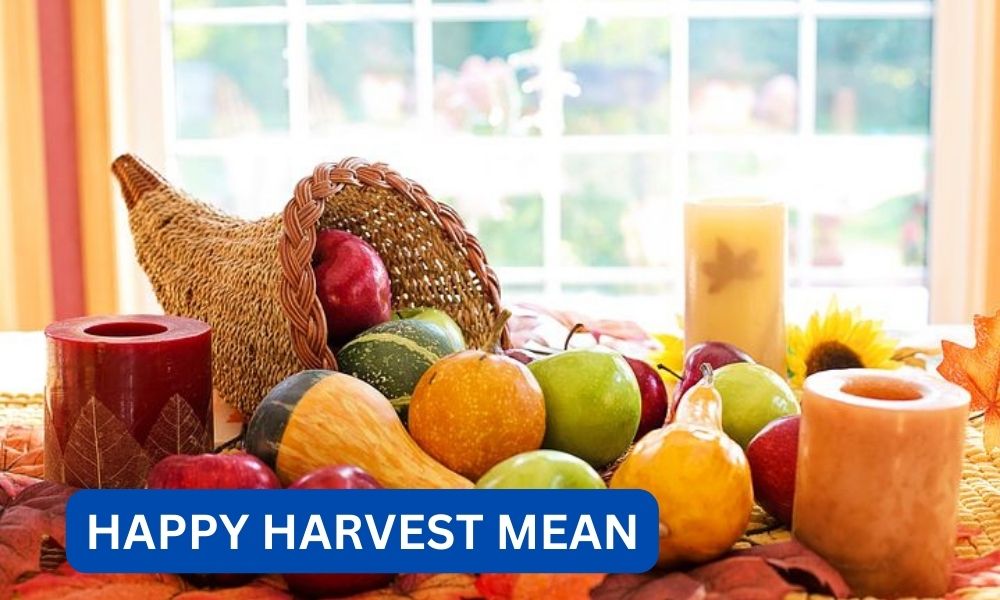When we think of the term “happy harvest,” it conjures up images of bountiful fields, ripe fruits, and a sense of contentment. But what does it really mean? In this article, we will explore the concept of happy harvest, its origins, and its significance in different cultures and contexts. We will delve into the emotional and cultural aspects associated with a successful harvest and how it impacts individuals and communities. Let’s dive in and uncover the true meaning of happy harvest.
Contents
The Origins of Happy Harvest
The concept of a happy harvest has its roots in agricultural societies, where the success of the harvest season was crucial for survival. In ancient times, people relied heavily on the land for sustenance, and a bountiful harvest meant an abundance of food and resources for the community. The happiness associated with a successful harvest was not just about the physical abundance but also the relief from the fear of scarcity and hunger.
Throughout history, different cultures have celebrated the harvest season in various ways. Festivals, rituals, and ceremonies were held to express gratitude to the gods or nature for providing a fruitful harvest. These celebrations often involved feasting, music, dancing, and other forms of merriment. The happiness experienced during these festivities was a reflection of the collective joy and relief felt by the community.
Read:What are negative windows on a boat?The Emotional Significance of a Happy Harvest
While a happy harvest is undoubtedly linked to material abundance, its emotional significance goes beyond just the tangible benefits. The successful culmination of months of hard work and uncertainty brings a sense of accomplishment and pride to farmers and agricultural communities. It validates their efforts and reaffirms their connection to the land.
Moreover, a happy harvest fosters a sense of security and stability. It provides a buffer against future uncertainties and allows individuals and communities to plan for the future with confidence. This emotional security contributes to overall well-being and happiness.
Research has shown that a successful harvest can have a positive impact on mental health. A study conducted by the University of Essex found that individuals who engaged in gardening or farming reported higher levels of well-being and lower levels of depression and anxiety. The act of nurturing plants and witnessing the fruits of one’s labor can be deeply fulfilling and therapeutic.
Cultural Significance of Happy Harvest
The concept of a happy harvest is deeply ingrained in many cultures around the world. Let’s explore some examples:
1. Thanksgiving in the United States
Thanksgiving, celebrated on the fourth Thursday of November in the United States, is a holiday that revolves around the idea of a happy harvest. It originated as a way for early European settlers to express gratitude for a successful harvest and the assistance provided by Native American communities. Today, Thanksgiving is a time for families and friends to come together, share a meal, and give thanks for the blessings in their lives.
Read:What are baphomet rings?2. Harvest Festival in India
In India, the harvest season is celebrated with great enthusiasm through various regional harvest festivals. One such festival is Pongal, celebrated in the southern state of Tamil Nadu. Pongal is a four-day festival dedicated to the Sun God and marks the end of the harvest season. It involves cooking a special dish called Pongal, made from newly harvested rice, and offering it to the gods as a sign of gratitude.
3. Oktoberfest in Germany
While not directly related to agriculture, Oktoberfest in Germany is a celebration deeply rooted in the harvest season. Originally a festival to honor the Bavarian Crown Prince’s marriage in 1810, it has evolved into a grand celebration of beer, food, and Bavarian culture. Oktoberfest is held in Munich and attracts millions of visitors from around the world, creating a festive atmosphere of joy and happiness.
The Importance of a Happy Harvest Today
In modern times, where most of us are disconnected from the process of food production, the concept of a happy harvest may seem distant. However, it remains relevant and important for several reasons:
- Agricultural communities still rely on a successful harvest for their livelihoods and well-being.
- Food security is a global concern, and a happy harvest ensures an adequate supply of food for communities.
- Connecting with nature and the land has numerous physical and mental health benefits.
- Celebrating the harvest season fosters a sense of community and gratitude.
By understanding and appreciating the concept of a happy harvest, we can develop a deeper connection with our food sources and the efforts of those who work tirelessly to bring food to our tables.
Read:What is pit run gravel?Conclusion
Happy harvest is more than just a phrase; it represents the culmination of hard work, the joy of abundance, and the emotional well-being of individuals and communities. From its origins in ancient agricultural societies to its cultural significance in different parts of the world, the concept of a happy harvest has stood the test of time.
Today, as we navigate a rapidly changing world, it is important to recognize and celebrate the harvest season. Whether it is through participating in local harvest festivals, supporting local farmers, or simply taking a moment to appreciate the food on our plates, we can all find ways to embrace the spirit of a happy harvest.
So, let us pause and reflect on the meaning of a happy harvest, and may it inspire us to cultivate gratitude, foster community, and nurture our connection with the land.









